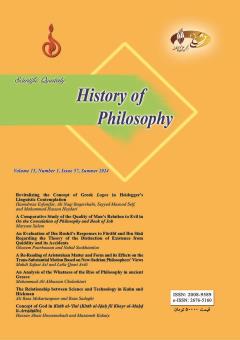A Comparative Study of the Quality of Man’s Relation to Evil in On the Consolation of Philosophy and Book of Job
Subject Areas : Geneology of philosophical schools and Ideas
1 - Assistant Professor, Philosophy and Kalam Department, Faculty of Theology and Religious Studies, Shahid Beheshti University, Tehran, Iran
Keywords: Job, Boethius, On the Consolation of Philosophy, Book of Job, fate,
Abstract :
In On the Consolation of Philosophy, in line with Stoics, Boethius explains the nature of evil, the quality of the interference of the divine providence in the world, and the relationship between evil and destiny following a philosophical approach. In this book, evil is considered to be necessary for a changing material world. True happiness, which cannot be realized in an unstable world, is the same Pure Good or God. He also states that with Man’s becoming divine all evil things and pains are weakened and become good. In this approach, Man plays no role in creating evil. The same view of evil can also be witnessed in the Book of Job. At the beginning of the book evil is sometimes considered to be the effect of Man’s sins, sometimes an educational element for Man’s avoiding sin, and sometimes a divine test to confirm insistence on piety. However, at the end of the book, it reads that evil basically lacks an external existence so that it would require a cause. An analysis of these two books demonstrates that in both of them all divine acts are good and, by submitting to God’s Will, Man turns the excruciating pain of some divine acts that annoy him into sweetness.
عهد عتیق، جلد اول، کتابهای شریعت یا تورات (1394) ترجمه پیروز سیار، تهران: هرمس.
عهد عتیق، جلد سوم، کتابهای حکمت (1400) ترجمة پیروز سیار، تهران: هرمس.
کتاب ایوب، منظومه آلام ایوب و محنتهای او از عهد عتیق (1400) گزارش فارسی قاسم هاشمینژاد، تهران: هرمس.
افلاطون (1380) دوره آثار افلاطون، ترجمه محمدحسن لطفی و رضاکاویانی، تهران: خوارزمی.
امینی، مریم (1399) ادبیات رنج، کندوکاوی در کتاب ایوب، تهران: فرهامه.
امینی، مریم؛ جلالیمقدم، مسعود (1394) «بررسی و نقد تاریخی کتاب ایوب»، معرفت ادیان، سال 6، شماره 2، ص86ـ75.
ایلخانی، محمد (1380) متافیزیک بوئتیوس، تهران: الهام.
ایلخانی، محمد (1382) تاریخ فلسفه در قرون وسطی و رنسانس، تهران: سمت.
بوئتیوس (1385) تسلای فلسفه، ترجمه سایه میثمی، تهران: نگاه معاصر.
پورمحمدی، نعیمه (1392) «دو تئودیسه بدیع در کتاب ایوب: تئودیسه آشکارشدگی خدا و تئودیسه اعتراض»، هفت آسمان، شمارة 59، ص162ـ143.
پورمحمدی، نعیمه؛ فصیحی رامندی، میثم (1396) «ارزیابی تئودیسه اعتراض در پاسخ به مسئله شر»، فلسفه دین، سال 14، شماره 3، ص631ـ609.
خراسانی، شرفالدین (1382) نخستین فیلسوفان یونانی، تهران: علمی و فرهنگی.
دیکسون، کندی مایک (1385) دانشنامه اساطیر یونان و روم، ترجمة رقیه بهزادی، تهران: طهموری.
زمانی، مهدی (1388) «نظریه تذکر و رسالت معنوی هنر»، پیام نور در حوزه علوم اسلامی، شماره 0، ص104ـ91.
سلیمانی اردستانی، عبدالرحیم (1397) بررسی متنی و سندی متون مقدس یهودیـمسیحی، تهران: سمت.
فرفوریوس (1366) دوره آثار فلوطین، ج2، تهران: خوارزمی.
کاوندی، سحر؛ قرجالو، داود (1392) «پاسخ بوئتیوس به دشوارۀ شر»، الهیات تطبیقی، شمارة 10، ص 104ـ93.
کهن، آبراهام (1382) گنجینهیی از تلمود، ترجمه از انگلیسی امیر فریدون گرگانی، ترجمه و تطبیق با متون عبری یهوشوع نتن¬الی، با اهتمام امیرحسین صدریپور، تهران: اساطیر.
Boethius (1968). The Theological Tractates and The Consolation of Philosophy. trans. by H. F. Stewart & E. K. Rand, London: Harvard University Press.
Boethius (2008). The Consolation of Philosophy. trans. by D. R. Slavitt. London: Harvard University Press.
Chadwick, H. (1981). Boethius, The Consolations of Music, Logic, Theology, and Philosophy. New York: Oxford University Press.
Hesiod (2006). Theogony, Works and Days, Testimonia. ed. and trans. by G. W. Most. London: Harvard University Press.

